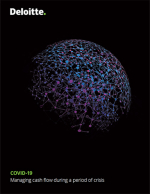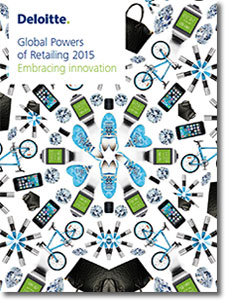Global Powers of Retailing 2015: Embracing Innovation
This year's report focuses on the theme of "embracing innovation," and considers some of the most important trends for the coming year as retailers cope with a rapidly changing marketplace.
The 18th annual Global Powers of Retailing identifies the 250 largest retailers around the world based on publicly available data for fiscal 2013 (encompassing companies’ fiscal years ended through June 2014), and analyzes their performance based on geographic region, product sector, e-commerce activity, and other factors. It also provides a look at the world’s 50 biggest e-retailers.
Global Powers of Retailing 2015: Embracing Innovation is much more than a list, however. It considers strategies retailers are taking to cope with disruptive change in the industry. Ira Kalish, Deloitte’s Chief Global Economist, provides an overview of the global economy and how it will impact the retail sector. There is also a section devoted to the “Q Ratio,” which is a way of measuring non-tangible business assets such as brand equity and customer loyalty.
Among the key insights included in the report:
- Five trends are reshaping retail: travel retailing, mobile retailing, faster retailing, experience retailing and innovative retailing.
- Important economic issues having a global impact on the retailing industry include shifts in U.S. monetary policy, energy production in the U.S., the crisis in Ukraine, the slowdown in Chinese investment, shifting demographics, and the influence of technology and the internet.
- Retailers of food and other fast-moving consumer goods continue to dominate the Top 250 in number and size of companies.
- International expansion remains an important growth strategy for many retailers.
- Despite rapid growth in the e-commerce arena, only two pure-play e-retailers were large enough to rank among the Top 250.
- U.S.-based retailers account for a disproportionate share of those that have generated considerable value through their non-tangible assets; Japanese retailers, on the other hand, account for a disproportionate share of those that do not.
Download the full report to learn more.
What’s Related




Favorites





